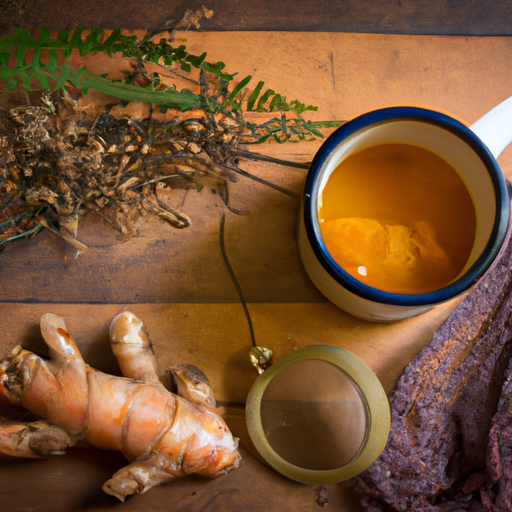As a long-time anxiety sufferer, I am constantly searching for natural solutions to alleviate my symptoms. Turmeric tea has emerged as a popular remedy in recent years.
But what exactly is turmeric tea, and how does it help with anxiety? Turmeric is a spice that has been used in traditional medicine for centuries, particularly in Ayurvedic and Chinese medicine. It is most commonly known for its anti-inflammatory properties, which make it a popular supplement for reducing joint pain and inflammation.
However, recent research has also shown that turmeric may have benefits for mental health, including reducing symptoms of anxiety. In this article, we will explore the science behind anxiety and the potential benefits of turmeric tea for managing symptoms.
Key Takeaways
- Turmeric tea is a natural remedy for anxiety that can promote relaxation and well-being.
- The anti-inflammatory properties of turmeric and the anxiolytic effects of curcumin may have benefits for mental health.
- Combining turmeric with other natural remedies, such as ginger and black pepper, can amplify its health benefits.
- While lifestyle changes and natural remedies may be helpful, seeking professional help through therapy or medication management may be necessary for managing anxiety.
The Science Behind Anxiety
You might be wondering how anxiety works in your body and why turmeric tea can help. Anxiety is a natural response to stress, but it can become debilitating when it persists for a long time. Understanding triggers is crucial to managing anxiety.
Triggers can be anything from a stressful job to a traumatic experience. Once you identify your triggers, you can work on developing coping strategies to manage your anxiety. Cognitive behavioral therapy is a common treatment for anxiety. This type of therapy helps you identify negative thought patterns and replace them with positive ones.
It also teaches you coping techniques to manage anxiety symptoms. Turmeric tea can complement cognitive behavioral therapy because it contains natural compounds that have been shown to have anti-anxiety effects. With that introduction to anxiety, let’s move on to an introduction to turmeric.
An Introduction to Turmeric
Turmeric is a spice commonly used in Indian cuisine and has been a part of traditional medicine for thousands of years. It is derived from the root of the Curcuma longa plant and is known for its bright yellow color and peppery flavor. The use of turmeric dates back to ancient times, where it was used for medicinal purposes, religious ceremonies, and as a dye. Today, turmeric is widely recognized for its health benefits and has been the subject of over 3,000 scientific studies.
Turmeric is not just a spice used in cooking, it also has a rich history in traditional medicine. It has been used to treat a variety of ailments such as digestive issues, respiratory problems, skin conditions, and joint pain. In Ayurvedic medicine, turmeric is believed to have anti-inflammatory properties and is used to treat a range of conditions. In addition to its medicinal uses, turmeric is also used in cooking to add flavor and color to dishes such as curries, rice, and soups. Its versatility and health benefits make it a popular ingredient in many households.
Turmeric’s anxiety-reducing properties have also been a topic of interest in recent years.
Turmeric’s Anxiety-Reducing Properties
With its bright yellow color and peppery flavor, turmeric has been studied for its potential ability to reduce anxiety. Specifically, curcumin, a compound found in turmeric, has been shown to have anxiolytic effects in animal studies.
Some research has also suggested that curcumin may help regulate neurotransmitters in the brain, such as serotonin and dopamine, which are involved in mood regulation and can contribute to anxiety when imbalanced.
To reap the potential anxiety-reducing benefits of turmeric, one can consume it in the form of turmeric tea. Turmeric tea ingredients typically include turmeric powder, black pepper, and other spices such as ginger and cinnamon.
The recommended turmeric tea dosage varies depending on the individual and their specific health needs, but a general guideline is to consume 1-2 teaspoons of turmeric powder per day.
In the next section, we’ll explore how to make turmeric tea to enjoy its potential health benefits.
How to Make Turmeric Tea
When feeling stressed or needing a warm drink, there’s a popular recipe that includes a golden spice often found in Indian cuisine. That’s right, we’re talking about turmeric tea!
Not only is turmeric tea a delicious and comforting beverage, but it also offers numerous benefits to our overall health. Here are just a few variations and benefits of making turmeric tea:
-
Basic turmeric tea: Simply boil water and add a teaspoon of turmeric. Let it steep for 5-10 minutes, then strain and enjoy. This basic recipe is a great way to experience the anti-inflammatory and antioxidant benefits of turmeric.
-
Turmeric ginger tea: Add some fresh ginger to the basic recipe for an extra boost of anti-inflammatory properties and a spicy kick.
-
Turmeric coconut milk tea: For a creamier and richer version, substitute water with coconut milk and add some honey or maple syrup for sweetness. This variation also provides healthy fats and lauric acid from the coconut milk.
Incorporating turmeric tea into your daily routine can have a positive impact on your physical and mental health.
In the next section, we’ll explore specifically how turmeric tea can help with anxiety and other mental health concerns.
Turmeric Tea and Mental Health
If you’re feeling overwhelmed, incorporating a warm and comforting drink into your daily routine can provide a sense of calm and relaxation. Turmeric tea, in particular, has been shown to have beneficial effects on mental health. Studies have suggested that curcumin, the active ingredient in turmeric, may improve mental clarity and reduce symptoms of anxiety and depression.
In addition to its potential mental health benefits, turmeric tea has also been found to have stress-reducing properties. It has been shown to lower cortisol levels, a hormone that is often associated with stress. By incorporating turmeric tea into your daily routine, you may be able to reduce feelings of stress and promote a sense of overall well-being. Moving forward, let’s explore some additional benefits of turmeric that you may not be aware of.
Additional Benefits of Turmeric
Like a ray of sunshine on a cloudy day, incorporating turmeric into your diet can provide a burst of health benefits beyond its known calming effects. In addition to reducing anxiety, turmeric has anti-inflammatory properties. This can improve joint health and reduce the risk of chronic diseases such as heart disease and cancer. Turmeric is also known to aid digestion, boost brain function, and improve skin health.
There are many ways to incorporate turmeric into your diet, including adding it to curries, soups, and stir-fries. Turmeric tea is another popular option, and there are many recipes available online. For those who prefer a more convenient option, turmeric supplements are also widely available. However, it’s important to note that supplements may not have the same benefits as incorporating turmeric into your diet through food or tea.
Transitioning into the subsequent section, combining turmeric with other natural remedies can be a powerful way to enhance its benefits.
Combining Turmeric with Other Natural Remedies
Combining turmeric with other natural remedies can amplify its health benefits, providing a holistic approach to wellness. Turmeric’s anti-inflammatory and antioxidant properties make it a great addition to other natural remedies and herbal supplements. For instance, ginger and turmeric have been found to work well together in reducing inflammation and easing digestion. Similarly, adding black pepper to turmeric enhances its absorption and bioavailability.
Other natural remedies that can be combined with turmeric include ashwagandha, a powerful adaptogen that helps the body adapt to stress, and holy basil, an herb traditionally used in Ayurvedic medicine for its calming effects on the mind and body. When combined with turmeric, these natural remedies can help alleviate anxiety and promote overall well-being.
By incorporating turmeric into a holistic approach to wellness that includes other natural remedies and lifestyle changes, individuals can experience the full benefits of this powerful spice. In the next section, we will explore some lifestyle changes that can further aid in managing anxiety.
Managing Anxiety with Lifestyle Changes
Combining turmeric with other natural remedies can be a great way to manage anxiety, but it’s important to remember that it’s not a one-size-fits-all solution. While turmeric tea can certainly be helpful, it’s also important to consider other lifestyle changes that may help manage anxiety.
Mindfulness techniques, for example, can be a great way to calm the mind and reduce stress. This might include things like meditation or deep breathing exercises. Finding a regular mindfulness practice that works for you can be a powerful tool in managing anxiety.
Another lifestyle change that can be helpful is incorporating regular exercise into your routine. Exercise has been shown to be an effective way to reduce anxiety symptoms, and it can also improve overall mood and reduce stress levels. This could be as simple as going for a daily walk or jog, or finding a workout routine that you enjoy. Whatever form of exercise you choose, finding a way to incorporate it into your daily routine can make a big difference in managing anxiety.
While lifestyle changes like mindfulness and exercise can be helpful in managing anxiety, it’s important to remember that they may not be enough on their own. In some cases, seeking professional help from a therapist or other mental health professional may be necessary.
Seeking Professional Help
If you’re feeling overwhelmed by anxiety, it’s important to remember that seeking professional help can be a beacon of light in an otherwise dark stormy sea. There are a variety of therapy options available to those seeking help with anxiety, including cognitive-behavioral therapy, exposure therapy, and mindfulness-based therapy. These therapies can help individuals learn coping mechanisms and strategies to manage their anxiety in a healthy and productive way.
In addition to therapy options, medication management can also be a helpful tool in managing anxiety. Medications such as anti-depressants and anti-anxiety medications can help individuals manage their symptoms and improve their quality of life. It’s important to work with a healthcare provider to find the right medication and dosage for each individual’s needs. Seeking professional help can feel daunting, but it’s important to remember that help is out there and taking the first step towards managing anxiety can lead to a happier and healthier life.
| Therapy Options | Description | Pros | Cons | Cost |
|---|---|---|---|---|
| Cognitive-Behavioral Therapy | Focuses on identifying and changing negative thought patterns and behaviors | Evidence-based, effective in treating anxiety disorders | Requires ongoing commitment and participation, may not be covered by insurance | $$-$$$ |
| Exposure Therapy | Gradual exposure to anxiety-provoking situations to desensitize the individual | Effective in treating phobias and PTSD | Can be emotionally challenging, may not be covered by insurance | $$-$$$ |
| Mindfulness-Based Therapy | Focuses on being present in the moment and non-judgmentally observing thoughts and feelings | Can improve emotional regulation and reduce anxiety | Requires ongoing practice and participation, may not be covered by insurance | $$-$$$ |
Frequently Asked Questions
Can turmeric tea completely cure anxiety?
As someone who has struggled with anxiety, I know first-hand that there is no one-size-fits-all cure. While turmeric tea may have some long term effectiveness as an alternative therapy, it is unlikely to completely cure anxiety on its own. It is important to consult with a healthcare professional and explore a range of treatment options.
How long does it take for turmeric tea to start reducing anxiety symptoms?
I have found that regularly drinking turmeric tea can start reducing anxiety symptoms within a few weeks. However, it is important to note that it may not completely cure anxiety and should be used in conjunction with other treatments.
Are there any side effects of drinking turmeric tea for anxiety?
Oh, the joys of drinking turmeric tea for anxiety! But, before you brew a cup, let’s talk about possible side effects. Let’s also compare its effectiveness with other natural remedies for anxiety. Let’s stay informed and evidence-based, shall we?
Can turmeric tea be used as a replacement for prescription medication for anxiety?
I cannot recommend using turmeric tea as a replacement for prescription medication for anxiety. While alternative treatments and natural remedies can be helpful, it’s important to work with a healthcare professional to determine the best treatment plan for your individual needs.
Is there a recommended dosage for consuming turmeric tea to manage anxiety?
To manage anxiety with turmeric tea, recommended consumption varies depending on the individual and severity of symptoms. Benefits of turmeric tea for anxiety include reducing inflammation and promoting relaxation.
Conclusion
Overall, incorporating turmeric tea into my daily routine has been a game-changer for managing my anxiety. The calming properties of curcumin have been shown to reduce inflammation in the brain and promote the production of serotonin and dopamine, two neurotransmitters that help regulate mood and emotions.
Sipping on a warm cup of turmeric tea in the morning has become a soothing ritual that helps me start my day on a positive note. As the spicy aroma fills my senses, I feel a sense of calm wash over me, allowing me to tackle the day’s challenges with a clear and focused mind. It’s like a warm hug in a cup, providing comfort and support when I need it most.
So if you’re struggling with anxiety, I highly recommend giving turmeric tea a try. In the words of Rumi, "As you start to walk out on the way, the way appears."Incorporating turmeric tea into your daily routine may just be the first step towards a more peaceful and balanced life. With its numerous health benefits, it’s worth exploring this natural remedy as a way to support your mental and physical well-being.
So why not give it a try and see where the path takes you?










